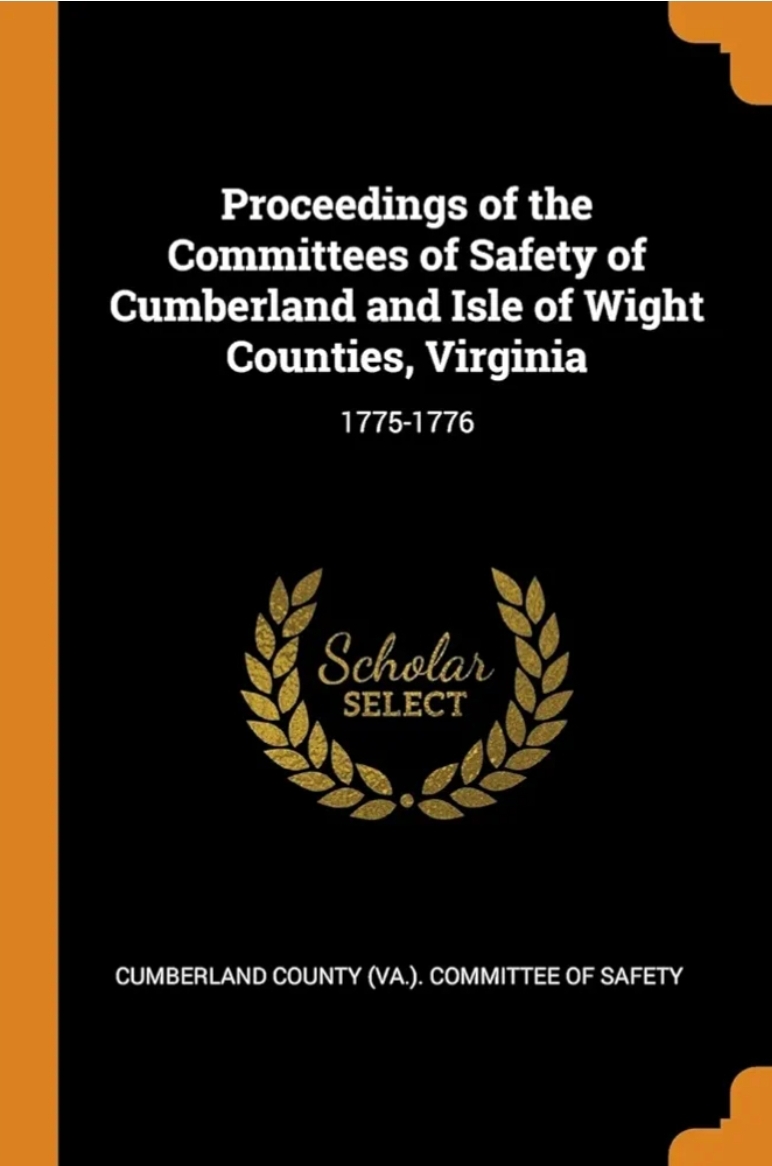Proceedings of the Committees of Safety of Cumberland and Isle of Wight Counties, Virginia: 1775-1776 by the Cumberland County (Va.) Committee of Safety is a historical document that captures the activities and decisions of the local committees of safety during the crucial early years of the American Revolutionary War. These committees were established as part of the colonial effort to organize resistance against British authority and were instrumental in maintaining order and providing governance during the period of conflict.
Main Themes of the Document:
- Local Governance during the Revolution: The Committees of Safety were formed to act as provisional governments at a local level during the Revolution when colonial governments had been disrupted. These committees were responsible for enforcing the decisions of the Continental Congress, overseeing military preparedness, and managing local affairs. This document details the decisions and resolutions made by the Cumberland and Isle of Wight County committees in Virginia during 1775 and 1776, showcasing how local governance was conducted in a time of upheaval.
- Military Preparations and Civil Defense: A key focus of the proceedings is the military preparations undertaken by these committees. They played a significant role in raising local militias, ensuring the supply of arms and ammunition, and organizing defenses against British forces. The document records resolutions regarding the recruitment and training of militia forces, as well as instructions for safeguarding strategic resources and supplies critical to the revolutionary cause.
- Support for the Continental Congress: The document illustrates the committees’ loyalty to the Continental Congress and the larger revolutionary effort. The committees acted as an extension of the broader patriot movement, enforcing boycotts of British goods, collecting taxes to support the war effort, and ensuring that dissent or loyalty to the Crown was addressed within the community.
- Handling Loyalist Sentiment: Another important theme in the proceedings is the management of Loyalists (colonists who remained loyal to Britain). The committees had the authority to arrest, question, and even detain individuals suspected of supporting British rule. The document records the procedures and actions taken against Loyalists in the region, as the committees sought to ensure unity in the struggle for independence.
- Maintaining Public Order: In addition to military and political duties, the committees also focused on maintaining law and order. With the colonial government weakened, the committees had to manage local disputes, enforce laws, and ensure that supplies, like food and goods, were fairly distributed. These proceedings document how the committees handled issues of public safety, economic stability, and internal conflicts within the community.
- Role of Local Leaders: The document highlights the leadership of local patriots, many of whom played important roles in organizing the resistance. These figures not only managed local affairs but also worked to coordinate with other committees across Virginia and beyond. The proceedings provide a glimpse into the decision-making processes and the challenges faced by these leaders as they navigated the uncertainties of revolution.
Historical Significance:
The Proceedings of the Committees of Safety of Cumberland and Isle of Wight Counties, Virginia: 1775-1776 offers a valuable historical record of the inner workings of grassroots governance during the American Revolution. It sheds light on how ordinary citizens, through local institutions, contributed to the war effort, managed their communities, and laid the groundwork for the creation of new democratic systems in the aftermath of British colonial rule. This document is significant for historians studying local governance, military organization, and community dynamics during the Revolutionary War.
Conclusion:
This document provides detailed insights into the activities of the Committees of Safety in Cumberland and Isle of Wight Counties during the early stages of the American Revolution. It offers a window into the day-to-day governance and military organization at the local level, demonstrating the pivotal role these committees played in maintaining order, supporting the revolutionary cause, and ensuring the security of their communities in a time of war.






